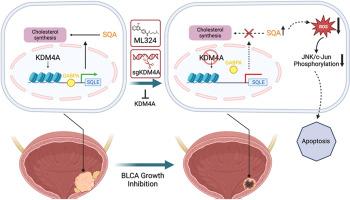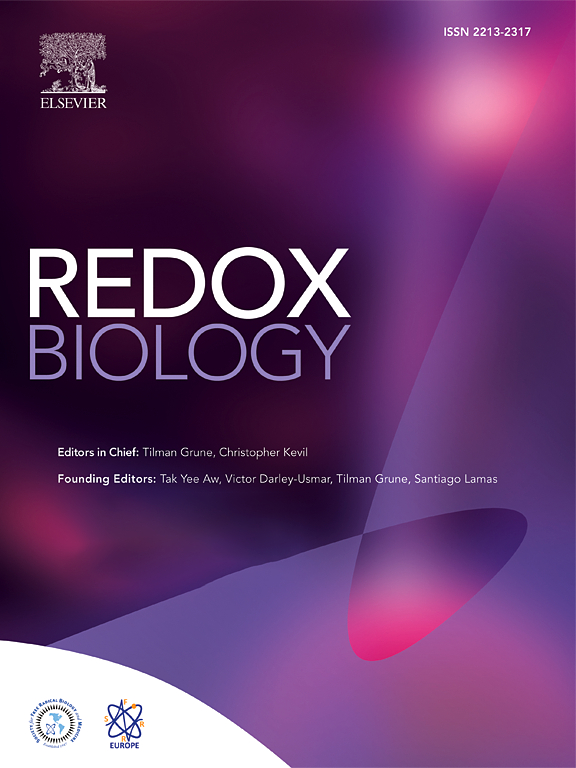Inhibition of KDM4A restricts SQLE transcription and induces oxidative stress imbalance to suppress bladder cancer
IF 10.7
1区 生物学
Q1 BIOCHEMISTRY & MOLECULAR BIOLOGY
引用次数: 0
Abstract
In clinical practice, the limited efficacy of standard comprehensive therapy for advanced bladder cancer and the lack of targeted treatment options are well recognized. Targeting abnormal epigenetic modifications in tumors has shown considerable potential in cancer therapy. Through drug screening in tumor organoids, we identified that ML324, a histone lysine demethylase 4A (KDM4A) inhibitor, exhibits potent antitumor effects in both in vitro and in vivo cancer models. Mechanistically, Kdm4a demethylates H3K9me3, leading to chromatin opening and increased accessibility of Gabpa to the squalene epoxidase (Sqle) gene promoter, resulting in transcriptional activation. Inhibition of Kdm4a downregulates Sqle transcription, blocking cholesterol synthesis and causing squalene (SQA) accumulation. This process induces reactive oxygen species (ROS) clearance and suppresses JNK/c-Jun phosphorylation, ultimately inducing apoptosis. Furthermore, ML324 treatment significantly inhibited tumor growth in bladder cancer patient-derived xenograft (PDX) models. Our findings reveal the presence of a Kdm4a-Sqle-ROS-JNK/c-Jun signaling axis that regulates oxidative stress balance, offering a novel strategy for targeted therapy in bladder cancer.

抑制 KDM4A 可限制 SQLE 的转录并诱导氧化应激失衡,从而抑制膀胱癌。
在临床实践中,人们公认晚期膀胱癌的标准综合疗法疗效有限,而且缺乏靶向治疗方案。针对肿瘤中异常表观遗传修饰的靶向治疗在癌症治疗中已显示出相当大的潜力。通过在肿瘤器官组织中进行药物筛选,我们发现组蛋白赖氨酸去甲基化酶 4A(KDM4A)抑制剂 ML324 在体外和体内癌症模型中都表现出了强大的抗肿瘤作用。从机理上讲,Kdm4a 会使 H3K9me3 去甲基化,导致染色质开放,增加 Gabpa 与角鲨烯环氧化物酶(Sqle)基因启动子的可及性,从而激活转录。抑制 Kdm4a 会下调 Sqle 的转录,阻止胆固醇的合成并导致角鲨烯(SQA)的积累。这一过程会诱导活性氧(ROS)清除,抑制 JNK/c-Jun 磷酸化,最终诱导细胞凋亡。此外,ML324 还能显著抑制膀胱癌患者异种移植(PDX)模型中的肿瘤生长。我们的研究结果揭示了调节氧化应激平衡的 Kdm4a-Sqle-ROS-JNK/c-Jun 信号轴的存在,为膀胱癌的靶向治疗提供了一种新策略。
本文章由计算机程序翻译,如有差异,请以英文原文为准。
求助全文
约1分钟内获得全文
求助全文
来源期刊

Redox Biology
BIOCHEMISTRY & MOLECULAR BIOLOGY-
CiteScore
19.90
自引率
3.50%
发文量
318
审稿时长
25 days
期刊介绍:
Redox Biology is the official journal of the Society for Redox Biology and Medicine and the Society for Free Radical Research-Europe. It is also affiliated with the International Society for Free Radical Research (SFRRI). This journal serves as a platform for publishing pioneering research, innovative methods, and comprehensive review articles in the field of redox biology, encompassing both health and disease.
Redox Biology welcomes various forms of contributions, including research articles (short or full communications), methods, mini-reviews, and commentaries. Through its diverse range of published content, Redox Biology aims to foster advancements and insights in the understanding of redox biology and its implications.
 求助内容:
求助内容: 应助结果提醒方式:
应助结果提醒方式:


